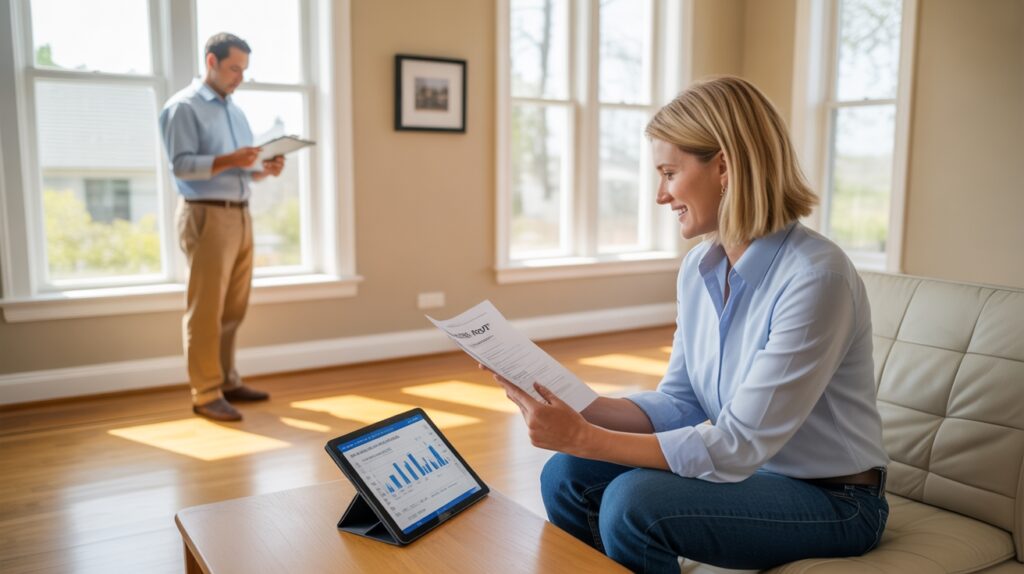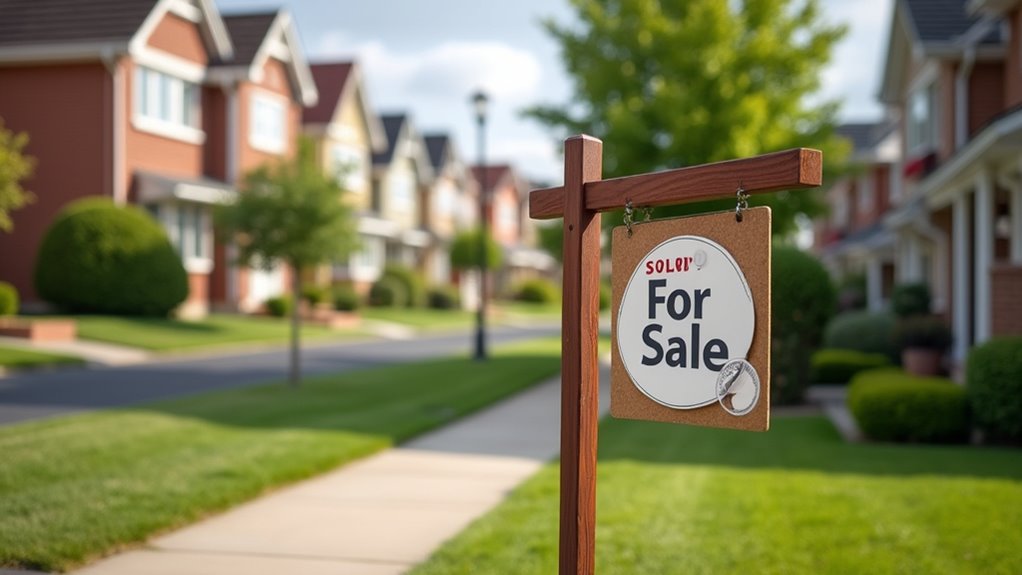Gasping at a $250,000 tax bill after selling your dream home can turn celebration into financial nightmare. Many homeowners remain unaware of potential tax implications until receiving an unexpected IRS notice. The stress compounds when filing deadlines approach without proper documentation. Fortunately, understanding specific exclusions and requirements can protect your home sale profits.
When selling your primary residence, you generally don’t pay taxes on profits up to $250,000 for singles or $500,000 for married couples. These exclusions apply only when you’ve lived in the home for at least two of the past five years. Investment properties and gains exceeding these thresholds trigger tax obligations.
In this blog I will explore everything related to paying taxes when selling your house.
Key Takeaways
- You may avoid taxes on gains up to $250,000 for singles or $500,000 for married couples if criteria are met.
- The home must have been owned and used as a primary residence for at least 2 of the last 5 years.
- Gains exceeding the exemption limits are subject to capital gains tax based on profit and ownership duration.
- Selling an investment property or second home typically incurs taxes; a 1031 exchange can defer taxes on investment properties.
- Inherited homes have a stepped-up basis, often reducing taxable gains, and most estates are not subject to federal estate taxes.
Do You Have to Pay Taxes When You Sell Your House?
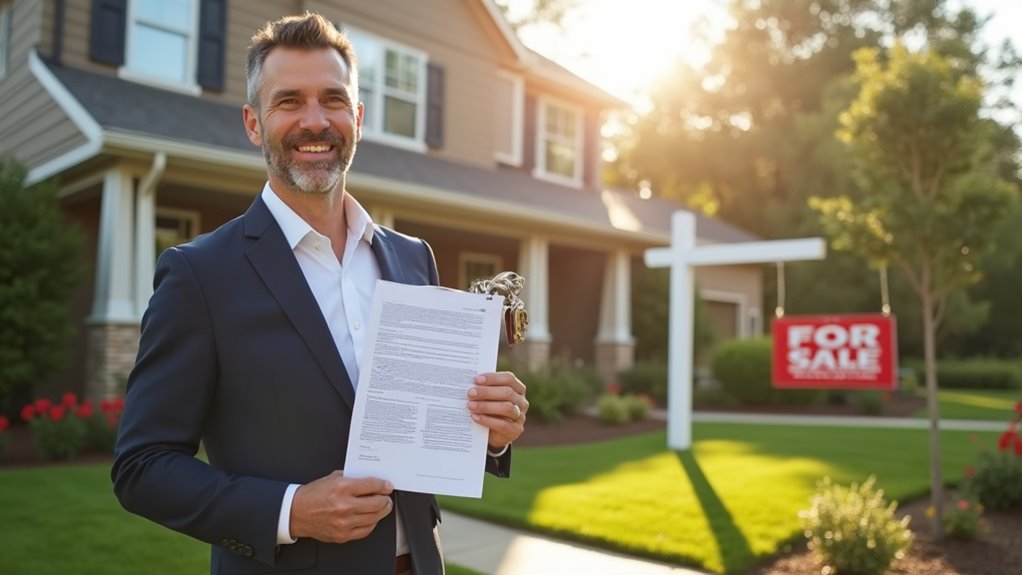
Yes, you might need to pay taxes when selling your home, but many homeowners qualify for exclusions. The IRS offers a home sale tax exemption of up to $250,000 for single filers or $500,000 for married couples filing jointly. To qualify, you must meet specific ownership and use requirements.
This exemption applies to your capital gains—the profit from selling your house for more than you paid. For example, if you bought your home for $200,000 and sold it for $400,000, your $200,000 profit might be tax-free. However, special circumstances may affect your tax situation.
What Is the Home Sale Tax Exemption?
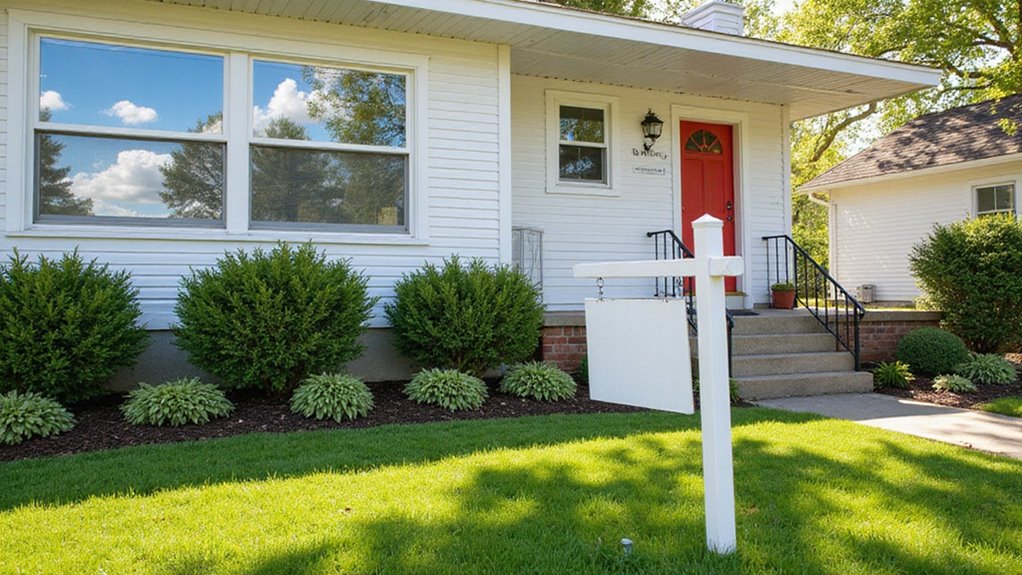
The home sale tax exemption allows you to exclude up to $250,000 (single) or $500,000 (married) in gains from your primary residence, provided you meet IRS rules.
IRS Section 121 governs this exclusion, requiring you to own and live in the home for at least two of the last five years. Ensuring your property qualifies as your primary residence is key to maximizing this benefit and minimizing taxes.
Capital Gains Exclusion Basics
You can avoid taxes on profits when selling your home. This federal tax benefit applies to your primary residence only. You must meet ownership and use requirements to qualify.
Single homeowners can exclude up to $250,000 in profits from taxes. Married couples filing jointly can exclude up to $500,000.
Furthermore, you must have owned and lived in the home for at least 2 out of the last 5 years. Special circumstances may qualify you for partial exemptions.
This helps reduce your tax burden in situations like job changes or health issues. Any profit above exclusion limits gets taxed at lower capital gains rates rather than regular income tax rates.
IRS Section 121 Tax Rules
Section 121 allows you to exclude up to $250,000 of profit from home sale taxes ($500,000 for married couples). You must own and live in your home for at least 2 of the 5 years before selling.
Keep receipts for all home improvements as they increase your cost basis. The timing matters—your residency period doesn’t need to be continuous.
You can’t claim this exclusion more than once in any 2-year period. This tax break saves homeowners thousands in capital gains taxes when they sell their primary residence.
Primary Residence Requirements
You must live in your home to get tax benefits when selling. This property needs to be your main dwelling where you spend most of your time.
You must own the property for at least 2 years and use it as your primary residence during that period. The tax exemption allows singles to exclude $250,000 and married couples $500,000 from capital gains.
Furthermore, the IRS only recognizes one primary residence at a time. Properties primarily used as rentals or vacation homes don’t qualify. In addition, your eligibility depends on meeting specific IRS standards for occupancy.
How Much Tax Will You Pay on a Home Sale?
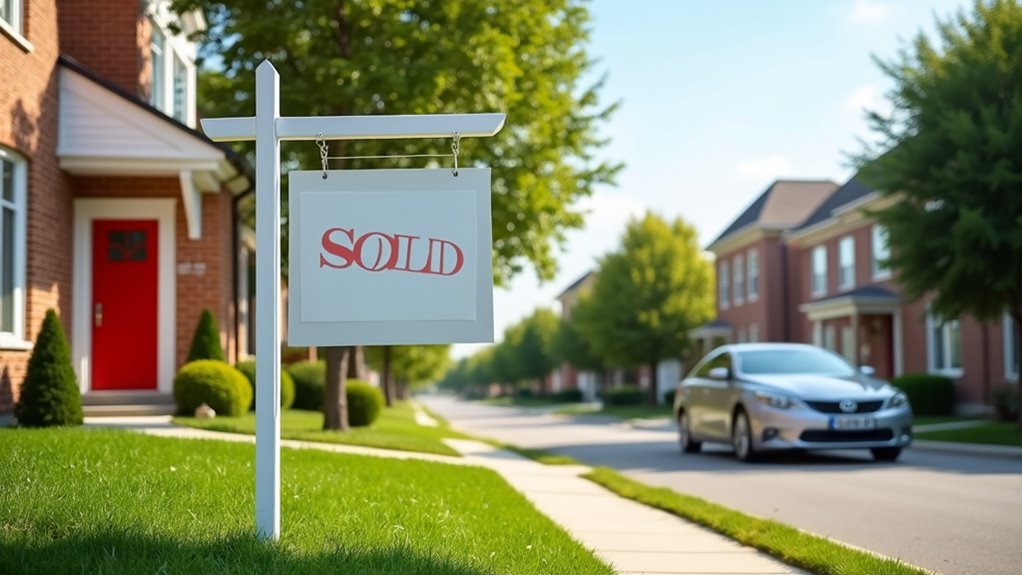
Your tax liability on a home sale depends on whether your gains are short-term or long-term, with different rates applying based on your ownership period.
If your profit exceeds the federal exclusion limits, you’ll pay capital gains tax at the applicable rate, which varies by income and state rules.
In Ohio, expect to consider both federal and state taxes, as state capital gains are taxed as ordinary income with no special exemptions beyond federal rules.
Capital Gains Tax Rates
Capital gains tax on home sales varies based on how long you’ve owned the property and your profit amount. Long-term capital gains tax rates range from 0% to 20%, depending on your income bracket.
Short-term gains are taxed as ordinary income. Most homeowners qualify for substantial tax breaks. Single taxpayers can exclude up to $250,000 in profits, while married couples can exclude up to $500,000.
Additionally, Ohio residents must consider state taxes on their gains. However, these state rates are typically lower than federal ones.
In many cases, you’ll only face tax liability if your profit exceeds the exclusion thresholds. For instance, a couple selling with a $600,000 profit would only pay capital gains tax on $100,000.
Short-Term vs. Long-Term Capital Gains
Capital gains are taxed differently based on how long you’ve owned your property. Short-term gains apply to properties held less than one year and are taxed as ordinary income.
Long-term gains apply to properties owned longer than one year and qualify for lower tax rates. This timing distinction can significantly impact your tax bill. Homeowners often benefit from waiting until they qualify for long-term status.
The tax savings can be substantial, especially for higher-income sellers. For this reason, strategic timing of your home sale matters. Many sellers postpone their transactions to reach the one-year threshold.
State and Local Tax Considerations
State and local taxes impact your total profit when selling a home. Most states tax capital gains from home sales, with rates varying from 0% to over 13%. Primary residences often qualify for tax breaks at state and local levels.
Ohio reassesses property values every six years, which affects property tax calculations. Local tax rates differ between counties and cities within the same state. These variations can significantly reduce your net proceeds.
Recent property value changes in your area might trigger reassessments. Federal tax exemptions ($250,000 for single filers, $500,000 for married couples) don’t always apply to state taxes. Additionally, some municipalities charge transfer taxes when ownership changes.
How to Calculate Your Home Sale Profit?
To determine your home sale profit, start by calculating your cost basis, which includes your purchase price plus significant improvements.
Next, account for any home upgrades that add value, extending your home’s lifespan or adapting it to new uses. Finally, subtract your adjusted basis from the sale price to find your capital gain and assess possible tax implications.
Determining Your Cost Basis
Your cost basis is the original purchase price plus qualifying expenses. Start by adding your home’s purchase price. Next, include the cost of major home improvements like new roofs or room additions. Selling costs such as agent commissions and legal fees can also be included in your calculations.
Property taxes paid during ownership may affect your basis too. This accurate calculation helps you determine your true profit. With the correct basis figure, you can properly calculate any capital gains tax obligation. In essence, a higher cost basis means lower taxable profit when you sell your home.
Accounting for Home Improvements
Only certain home improvements increase your tax basis when selling. Kitchen remodels, new roofs, and garage additions qualify because they add value and extend your home’s life. Landscaping adds value but doesn’t extend lifespan.
Track all improvement expenses with receipts and documentation for tax purposes. This record-keeping helps reduce potential capital gains tax when you sell.
Simple maintenance like painting doesn’t qualify for basis increases. Instead, focus on substantial upgrades that enhance your property’s market worth. As a result, you’ll have proper documentation ready when calculating your profit on sale.
Calculating Final Sale Proceeds
Your final sale proceeds equal your sale price minus your adjusted basis. Start with the full amount paid by the buyer. Subtract your original purchase price plus improvement costs.
You can deduct selling expenses like agent commissions, transfer taxes, and closing costs. Remember to gather all receipts for home improvements made over the years. These reduce your taxable profit.
The IRS allows most homeowners to exclude up to $250,000 in gains ($500,000 for married couples filing jointly). For an accurate calculation, consult with a tax professional. They can help identify all eligible deductions specific to your situation.
Do You Qualify for Tax Exemptions?
To qualify for tax exemptions when selling your home, you need to meet specific ownership and use requirements, such as living in the property for at least two of the past five years. Partial exemptions may apply if you face special circumstances like job changes or health issues.
If you’re married and filing jointly, you could effectively exclude up to $500,000 in gains, provided both meet the residency and ownership criteria.
Ownership and Use Tests
To qualify for the home sale tax exemption, you must meet two main tests. You must own your home for at least two years and use it as your primary residence.
The IRS requires that you live in the home for at least two out of the five years before selling. Only one property can be your main home at any given time.
Additionally, timing matters for your tax benefits. You can’t claim this exemption if you’ve already excluded another home sale within the past two years. These requirements help determine if your home sale profits qualify for tax-free treatment.
Partial Exemptions for Special Circumstances
Some situations allow partial tax exemptions when you don’t meet full ownership and use tests. The IRS permits reduced capital gains exclusions for qualifying life events. Job relocations, health conditions, and unexpected circumstances may qualify you for partial tax relief.
These exceptions help reduce your tax burden during challenging transitions. People who must sell due to military orders or sudden job transfers often benefit from these provisions.
The partial exemption amount is typically calculated as a fraction of the full $250,000/$500,000 exclusion. The fraction reflects how long you owned and lived in the home compared to the required period.
Furthermore, medical necessities and family emergencies can trigger qualification for these special provisions. Always document your qualifying circumstance thoroughly for IRS verification.
Marriage and Joint Filing Benefits
Married couples can exclude up to $500,000 in capital gains from home sales when filing jointly. This doubles the standard $250,000 individual exemption. You must meet ownership and use requirements to qualify. Both spouses need to have lived in the home for at least 2 out of 5 years before the sale.
Filing jointly offers significant tax advantages beyond just the increased exemption. The process simplifies tax reporting requirements for couples. Additionally, this strategy helps preserve more of your investment returns for future financial goals.
What Paperwork Do You Need for Tax Reporting?
You need several key documents for proper tax reporting of a home sale. Purchase records establish your cost basis, while improvement receipts increase this basis to reduce taxable gains.
Sale documentation proves your profit calculation. Keep all records related to your home’s purchase price and any capital improvements.
For reporting purposes, gather your closing statements from both purchase and sale. If your gains fall under exclusion limits ($250,000 for singles, $500,000 for married filing jointly), you may not need to report the sale.
Otherwise, prepare IRS Schedule D and Form 8949. In addition, collect receipts for qualifying moving expenses if applicable.
How to Reduce Taxes When Selling Your House?
To lower your tax bill when selling your house, keep detailed records of all home improvements to maximize your basis. Timing your sale to meet the two-year residence requirement can also help you qualify for the full exclusion.
Although 1031 exchanges apply mainly to investment properties, exploring other strategies like leveraging moving expenses (if eligible) can further reduce your taxable gains.
Home Improvement Documentation
Save all receipts and records of your home improvements to reduce taxes when selling. These records increase your home’s cost basis, which lowers taxable profit.
Keep receipts for all major upgrades and renovations. Track when each improvement was completed. Photos showing before and after conditions provide visual proof of changes. Contractor information adds credibility to your documentation.
Remember to maintain copies of any tax forms related to your home sale. This organized approach ensures you claim all eligible improvements. Proper documentation can save thousands in capital gains taxes.
Timing Your Sale Strategically
The best time to sell your home is after you’ve lived in it for at least two years. This timing helps you qualify for capital gains tax exclusions. You should plan your sale date around tax deadlines to avoid penalties.
You must meet both ownership and use tests to claim the full exclusion benefit. Tax rules limit exclusions to one sale every two years. Proper timing can save you thousands in potential tax liability.
Remember to document all home improvements. These costs increase your cost basis and reduce taxable gains. The deadline for paying taxes on home sales varies based on your filing status and sale circumstances.
1031 Exchange Options
A 1031 exchange allows you to defer capital gains taxes when selling investment property. This tax strategy lets you swap one investment property for another without immediate tax consequences.
You must reinvest all proceeds into a like-kind property within specific timeframes to qualify under IRS rules. The benefits extend beyond basic tax deferral. You can upgrade your investments, consolidate multiple properties, or diversify your portfolio.
Furthermore, this approach helps preserve your investment capital for growth rather than losing it to taxation. Primary residences don’t qualify for 1031 exchanges – only properties held for investment or business purposes are eligible. Proper documentation is essential for a successful exchange.
Leveraging Moving Expense Deductions
Moving expense deductions now apply only to active-duty military personnel. The Tax Cuts and Jobs Act eliminated this deduction for civilians after 2017. Military members can still deduct unreimbursed moving costs on their federal returns.
Everyone else should focus on home selling expenses instead. These costs can reduce your taxable capital gain when you sell your property.
Selling expenses like realtor commissions, legal fees, and repair costs increase your cost basis. Keep detailed records of all home improvements made during ownership. This documentation proves valuable when calculating your final tax liability.
What Are the Special Scenarios for Home Sales?
When selling after a divorce, you may be able to split the exclusion if both spouses meet ownership and use criteria. Inherited property typically benefits from a stepped-up basis, meaning you pay taxes only on gains after inheritance.
Investment properties don’t qualify for the primary residence exclusion and are taxed fully unless you use a 1031 exchange to reinvest.
Selling After Divorce
You can still receive tax benefits when selling a home after divorce. Ex-spouses may split the $500,000 capital gains exclusion if both satisfy ownership and use requirements. Each person must have lived in the home for 2 of the last 5 years to qualify.
Property tax obligations should be clearly outlined in your divorce agreement. Document all sale proceeds carefully for tax purposes. The IRS requires complete records of how equity was divided between former spouses.
Furthermore, consider timing. Selling before finalizing your divorce might offer different tax advantages. Capital gains are calculated based on your original purchase price plus improvements minus depreciation claimed.
Inherited Property Tax Implications
Inherited properties receive a stepped-up basis for tax purposes. This means you’ll pay taxes only on gains above the property’s value at the time of inheritance, not the original purchase price.
The IRS allows this tax benefit to reduce the capital gains burden on heirs. Federal estate tax only applies to estates exceeding $12.92 million (2023). Most inheritors never face estate taxes at all.
The stepped-up basis essentially erases years of appreciation that would otherwise be taxable. For example, a house purchased for $100,000 but worth $500,000 when inherited saves you taxes on $400,000 of appreciation. Nevertheless, you should consult a tax professional about your specific situation.
Investment Property Considerations
Investment properties don’t qualify for the Section 121 home sale tax exclusion. This benefit is only for primary residences. Investment property sales are subject to capital gains tax based on the profit amount.
A 1031 Exchange offers tax deferral when you reinvest proceeds into similar property. The IRS requires identifying replacement property within 45 days and completing the purchase within 180 days. This strategy works well for investors looking to upgrade without immediate tax consequences.
Properties that were once rentals may face partial exclusion limitations if converted to primary residences. The tax treatment depends on how long you owned and lived in the property before selling. Consider consulting a tax professional before selling any investment real estate.
Ready to Sell Your House Without the Tax Headache? Contact Prestige Investments Cincinnati Today!
You can avoid real estate taxes when selling your Cincinnati home. This tax exemption applies when your profit stays below certain limits. Single homeowners can exclude up to $250,000 in profit from taxation.
Married couples filing jointly can exclude up to $500,000. The math is simple. If your profit falls under these thresholds, you pay nothing.
On the other hand, profits exceeding these limits will be taxed accordingly. For example, a couple selling with $450,000 profit owes no taxes. Prestige Investments Cincinnati helps homeowners navigate these rules while maximizing investment value.
Frequently Asked Questions
Can I Claim the Home Sale Exclusion if I Rented Out My House Temporarily?
You can’t claim the home sale exclusion if you rented out your house temporarily, as it no longer qualifies as your primary residence. Ensure you meet the ownership and use tests for full exclusion eligibility.
Does Ohio Have Any Additional Tax Benefits for Home Sellers?
Ohio follows federal rules for home sale taxes, offering no additional state-specific benefits. Focus on maximizing federal exclusions, document improvements, and meet residence requirements to serve clients effectively and optimize their tax outcomes.
How Does a Divorce Affect the Home Sale Tax Exemption?
When you’re going through a divorce, you can split the home sale tax exemption if both meet ownership and use requirements. It’s a win-win, helping you serve others by easing financial burdens during tough times.
Are There Penalties for Failing to Report a Home Sale Properly?
You face penalties if you don’t report your home sale properly, including fines or audits. To protect clients, ensure accurate documentation, timely filing, and compliance with IRS rules—helping them avoid costly mistakes and legal issues.
What Documentation Is Needed to Prove Residency for the Exclusion?
A stitch in time saves nine; you’ll need records of your purchase, major improvements, and proof of residence like utility bills or IRS Form 1099-S. Keep thorough documentation to confidently meet residency requirements and maximize your tax benefits.


